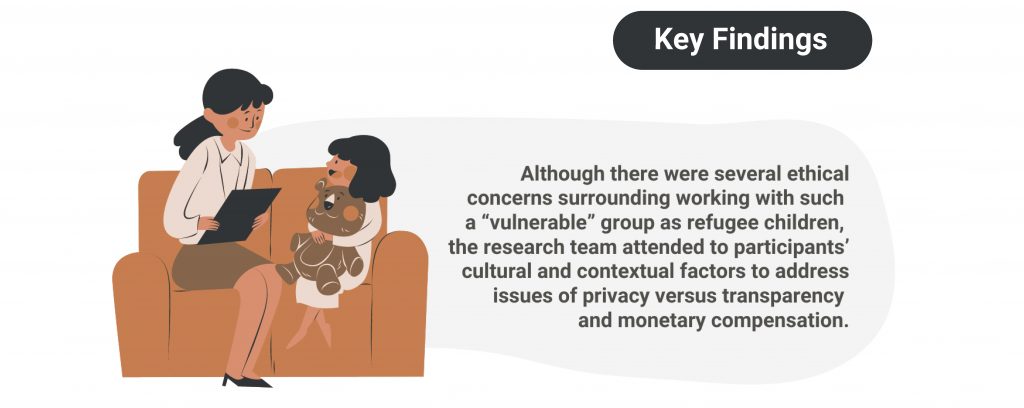Syrian Refugee Children’s Representations of their Memories of Syria, a Transition Country, and Early Days in Canada
Researchers: Mehrunnisa Ali1, Cyrus Sundar Singh1, Gina Gibran1
Affiliation:Toronto Metropolitan University1
Keywords: Syrian refugee children, transition country, Canada, memories, autobiography, art-based research, documentary, research ethics, qualitative methodology
Jump to: Full infographic, Methodology, Findings, Recommendations, Video, Publications & Reports
Summary
Overview: This study looked at Syrian refugee children’s memories of Syria, Jordan/ Lebanon, and early days in Canada through autobiographical drawings and writings, resulting in a short video documentary. The researchers also reflected on the ethical and methodological dimensions of working with refugee children.
Objective: to record the memories of a small number of Syrian refugee children, to lift their voices into the public sphere, to understand what the children remember and what conditions contribute to those memories, and to produce a short documentary capable of reaching a diverse audience.
Research Justification: Several scholars have advocated for children’s experiences to be articulated by children themselves. There is very little research recording the unique memories of Syrian refugee children or addressing the ethical challenges of working with this population. The short video document of children’s memories will help service providers, educators, and academics better understand Syrian children’s experiences.
Methodology
This study built on a recent project that recorded thirteen (5 to 13 years old) Syrian refugee children’s memories of Syrian, Jordan/Lebanon, and early days in Canada. These children had moved to Canada in the last 2-3 years. The children produced autobiographies with drawings and written/dictated texts which they discussed with the researchers. This was done over three sessions in the participants’ homes. The research assistants (RAs) who collected the data spoke Arabic and had prior experience working with Syrian refugee children. Towards the end of the project, the children presented their work to each other, their parents, and the researchers in two small groups. All these interactions were video recorded.
This dataset, including photographs of the children’s drawing and writing, video-records of their conversations with the researchers and presentations, and transcripts of research conversations, were selected, edited, and compiled to form a coherent narrative in the form of a video documentary.
Findings
There were several unique challenges to conducting research with Syrian refugee children:
Ethical issues:
- The research was conducted in participants’ homes, which the university Research Ethics Board (REB) flagged as potentially coercive, suggesting a lack of privacy, and a danger for those collecting the data.
- The research team argued that a familiar environment and presence of parents and siblings would put the children at ease and help if traumatic memories were raised. Parents were likely to be protective of their children due to past experiences and the transparency of the research would help build trust. This transparency was more important to participants than privacy. The research assistants (RAs) who collected the data worked in pairs and asked that the mother was at home during data collection.
- Monetary compensation of $100 was given for each child’s participation. The REB was concerned that this also signaled coercion, that the money was given to the parents not the children, and that the researchers would ask parents’ consent before asking the child’s assent in the presence of their parents.
- The handing of this sum of money by a parent (usually the father) was keeping with the norms followed by Syrian families. The consent practice allowed children to know the full terms of their participation and for parents and children to discuss the opportunity together. The families were giving their trust, time, attention, and records of their memories - which are worth much more than the monetary compensation - to research that does not directly benefit them.
Roles of the researchers:
- The RAs were Arabic-speaking women. They referred to the older women in the families as “aunties” to show culturally appropriate respect and friendliness. They accepted the food and drink offered to them as not doing so would be considered offensive.
- The children seemed to see the RAs as teachers, speaking to them primarily in English. It’s possible some understanding was lost by collecting data in English; however, many children would alternate between English and Arabic if they did not know the English word for what they wished to say.
- Some children discarded work they thought was not good enough, which may have been influenced by the expectation of an audience or the school-like nature of the tasks.
Children’s memories
- Children represented their memories in fragments, which did not easily yield coherent meanings. Additionally, children were playful with their drawings and language, using newly learned words, drawing things they had seen in books, and ‘decorating’ their work in ways that did not represent their memories ‘accurately’.
- The multiple forms of data collected (drawing, talking, video recording) yielded multiple layers of meaning, which would not have been accessed if using a single form of data.
- The children preferred to present their work when grouped by gender, reflecting social norms in Arab societies. This arrangement seemed to reduce the dominance of male voices and made the girls more confident in reading out their autobiographies.
- Many of the children’s memories were ‘implanted’ by significant adults. Their memories of Syria were vague and somewhat romanticized.
- Children (and their parents) highly valued English. Children wanted to avoid situations where Arabic was the language of communication. In school, they were punished for conversing in Arabic.
- Children were highly sensitive to their parents’ emotional states and were keenly aware of the injustices, fears, and distress their parents had encountered.
- For the most part, children in this study did not show residual signs of trauma.
Recommendations
- Consider contextual and cultural factors when working with populations deemed vulnerable by Research Ethics Boards.
- School boards need to ensure that teachers respect and value the first languages of children.
Video (Click to play)
Explore more projects



